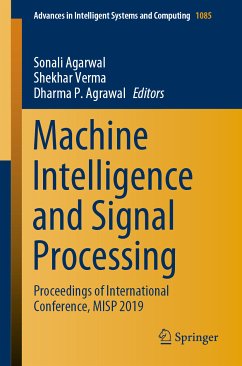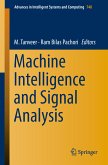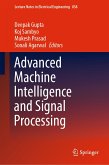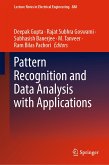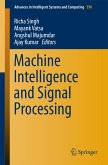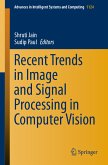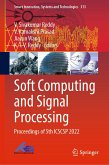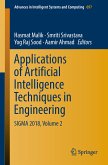Machine Intelligence and Signal Processing (eBook, PDF)
Proceedings of International Conference, MISP 2019
Redaktion: Agarwal, Sonali; Agrawal, Dharma P.; Verma, Shekhar


Alle Infos zum eBook verschenken

Machine Intelligence and Signal Processing (eBook, PDF)
Proceedings of International Conference, MISP 2019
Redaktion: Agarwal, Sonali; Agrawal, Dharma P.; Verma, Shekhar
- Format: PDF
- Merkliste
- Auf die Merkliste
- Bewerten Bewerten
- Teilen
- Produkt teilen
- Produkterinnerung
- Produkterinnerung

Hier können Sie sich einloggen

Bitte loggen Sie sich zunächst in Ihr Kundenkonto ein oder registrieren Sie sich bei bücher.de, um das eBook-Abo tolino select nutzen zu können.
This book features selected high-quality research papers presented at the International Conference on Machine Intelligence and Signal Processing (MISP 2019), held at the Indian Institute of Technology, Allahabad, India, on September 7-10, 2019. The book covers the latest advances in the fields of machine learning, big data analytics, signal processing, computational learning theory, and their real-time applications. The topics covered include support vector machines (SVM) and variants like least-squares SVM (LS-SVM) and twin SVM (TWSVM), extreme learning machine (ELM), artificial neural…mehr
- Geräte: PC
- ohne Kopierschutz
- eBook Hilfe
- Größe: 19.07MB
![Machine Intelligence and Signal Analysis (eBook, PDF) Machine Intelligence and Signal Analysis (eBook, PDF)]() Machine Intelligence and Signal Analysis (eBook, PDF)161,95 €
Machine Intelligence and Signal Analysis (eBook, PDF)161,95 €![Advanced Machine Intelligence and Signal Processing (eBook, PDF) Advanced Machine Intelligence and Signal Processing (eBook, PDF)]() Advanced Machine Intelligence and Signal Processing (eBook, PDF)193,95 €
Advanced Machine Intelligence and Signal Processing (eBook, PDF)193,95 €![Pattern Recognition and Data Analysis with Applications (eBook, PDF) Pattern Recognition and Data Analysis with Applications (eBook, PDF)]() Pattern Recognition and Data Analysis with Applications (eBook, PDF)153,95 €
Pattern Recognition and Data Analysis with Applications (eBook, PDF)153,95 €![Machine Intelligence and Signal Processing (eBook, PDF) Machine Intelligence and Signal Processing (eBook, PDF)]() Machine Intelligence and Signal Processing (eBook, PDF)73,95 €
Machine Intelligence and Signal Processing (eBook, PDF)73,95 €![Recent Trends in Image and Signal Processing in Computer Vision (eBook, PDF) Recent Trends in Image and Signal Processing in Computer Vision (eBook, PDF)]() Recent Trends in Image and Signal Processing in Computer Vision (eBook, PDF)73,95 €
Recent Trends in Image and Signal Processing in Computer Vision (eBook, PDF)73,95 €- -24%11
![Soft Computing and Signal Processing (eBook, PDF) Soft Computing and Signal Processing (eBook, PDF)]() Soft Computing and Signal Processing (eBook, PDF)226,95 €
Soft Computing and Signal Processing (eBook, PDF)226,95 € ![Applications of Artificial Intelligence Techniques in Engineering (eBook, PDF) Applications of Artificial Intelligence Techniques in Engineering (eBook, PDF)]() Applications of Artificial Intelligence Techniques in Engineering (eBook, PDF)161,95 €
Applications of Artificial Intelligence Techniques in Engineering (eBook, PDF)161,95 €-
-
-
Dieser Download kann aus rechtlichen Gründen nur mit Rechnungsadresse in A, B, BG, CY, CZ, D, DK, EW, E, FIN, F, GR, HR, H, IRL, I, LT, L, LR, M, NL, PL, P, R, S, SLO, SK ausgeliefert werden.
- Produktdetails
- Verlag: Springer Nature Singapore
- Seitenzahl: 466
- Erscheinungstermin: 25. Februar 2020
- Englisch
- ISBN-13: 9789811513664
- Artikelnr.: 58715838
- Verlag: Springer Nature Singapore
- Seitenzahl: 466
- Erscheinungstermin: 25. Februar 2020
- Englisch
- ISBN-13: 9789811513664
- Artikelnr.: 58715838
- Herstellerkennzeichnung Die Herstellerinformationen sind derzeit nicht verfügbar.
for Automated Driving.- Generalizing Streaming Pipeline Design for Big - Data.- Adaptive Fast Composite Splitting Algorithm for MR Image Reconstruction.- Extraction of Technical and Non-technical skills for Optimal Project-Team Allocation.- Modified Flower Pollination Algorithm for Optimal Power Flow in Transmission Congestion.- Intelligent Condition Monitoring of a CI Engine Using Machine Learning and Artificial Neural Networks.- Bacterial Foraging Optimization in Non-identical Parallel Batch Processing Machines.- Healthcare Information Retrieval based on Neutrosophic Logic.- Convolutional Neural Network Long Short-Term Memory (CNN+LSTM) for Histopathology Cancer Image Classification.- Forecasting with Multivariate Fuzzy Time Series: A Statistical Approach.- Nature-Inspired Algorithm-Based Feature Optimization for Epilepsy Detection.- A Combined Machine-Learning Approach for Accurate Screening and Early Detection of Chronic Kidney Disease.- Backpropagation and Self Organizing Map Neural Network Methods for Identifying Types of Eggplant Fruit.- Head Pose Prediction while Tracking Lost in a Head Mounted Display.- Recommendation to Group of Users using The Relevance Concept.- ACA: Attention based Context-aware Answer selection system.- Dense and Partial Correspondence in Non-Parametric Scene Parsing.- Audio Surveillance System.- MOPSA: Multiple Output Prediction for Scalability and Accuracy.- Impact of Cluster Sampling on the Classification of Landsat-8 Remote Sensing Imagery.- Deep Neural Networks for Out-Of-Sample Classification of Non-Linear Manifolds.- FPGA implementation of LDPC Decoder.- A Multiclass Classi_cation of Epileptic Activity in Patients using Wavelet Decomposition.- Hexa-Directional Feature Extraction for Target-Specific Handwritten Digit Recognition.- Cardiovascular Disease Prediction using Machine Learning Tools.- Analysis of Global Motion Compensation and Polar Vector Median for Object Tracking Using St-MRF In Video Surveillance.
for Automated Driving.- Generalizing Streaming Pipeline Design for Big - Data.- Adaptive Fast Composite Splitting Algorithm for MR Image Reconstruction.- Extraction of Technical and Non-technical skills for Optimal Project-Team Allocation.- Modified Flower Pollination Algorithm for Optimal Power Flow in Transmission Congestion.- Intelligent Condition Monitoring of a CI Engine Using Machine Learning and Artificial Neural Networks.- Bacterial Foraging Optimization in Non-identical Parallel Batch Processing Machines.- Healthcare Information Retrieval based on Neutrosophic Logic.- Convolutional Neural Network Long Short-Term Memory (CNN+LSTM) for Histopathology Cancer Image Classification.- Forecasting with Multivariate Fuzzy Time Series: A Statistical Approach.- Nature-Inspired Algorithm-Based Feature Optimization for Epilepsy Detection.- A Combined Machine-Learning Approach for Accurate Screening and Early Detection of Chronic Kidney Disease.- Backpropagation and Self Organizing Map Neural Network Methods for Identifying Types of Eggplant Fruit.- Head Pose Prediction while Tracking Lost in a Head Mounted Display.- Recommendation to Group of Users using The Relevance Concept.- ACA: Attention based Context-aware Answer selection system.- Dense and Partial Correspondence in Non-Parametric Scene Parsing.- Audio Surveillance System.- MOPSA: Multiple Output Prediction for Scalability and Accuracy.- Impact of Cluster Sampling on the Classification of Landsat-8 Remote Sensing Imagery.- Deep Neural Networks for Out-Of-Sample Classification of Non-Linear Manifolds.- FPGA implementation of LDPC Decoder.- A Multiclass Classi_cation of Epileptic Activity in Patients using Wavelet Decomposition.- Hexa-Directional Feature Extraction for Target-Specific Handwritten Digit Recognition.- Cardiovascular Disease Prediction using Machine Learning Tools.- Analysis of Global Motion Compensation and Polar Vector Median for Object Tracking Using St-MRF In Video Surveillance.
